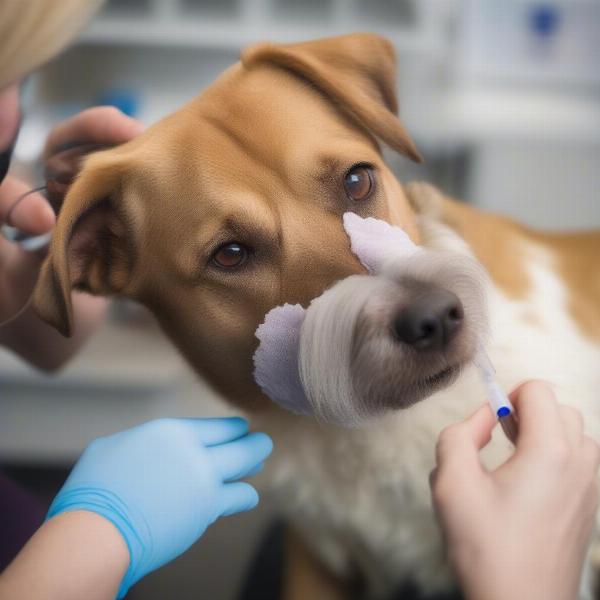Dogs, just like humans, can suffer from allergies. Itching, scratching, sneezing, and watery eyes are common symptoms. If you suspect your dog has allergies, you might be searching for effective relief. “Dogs piriton” is a common search term, referring to the use of Piriton (chlorphenamine maleate), an antihistamine, in dogs. This article will delve into the safety and effectiveness of Piriton for dogs, appropriate dosage, potential side effects, and when to consult a veterinarian.
Understanding Allergies in Dogs
Allergies occur when a dog’s immune system overreacts to harmless substances like pollen, dust mites, or certain foods. This reaction triggers the release of histamine, leading to the uncomfortable symptoms associated with allergies. While Piriton can help manage these symptoms, it’s crucial to understand its proper usage.
Is Piriton Safe for Dogs?
Yes, Piriton can be safely administered to dogs under the guidance of a veterinarian. However, it’s important to note that not all antihistamines are safe for dogs. Some can cause serious side effects. Always consult with your vet before giving your dog any medication, including Piriton. They can confirm the correct dosage and ensure it won’t interact with any other medications your dog might be taking.
Determining the Right Dosage
The correct dosage of Piriton for dogs depends on their weight and the severity of their allergies. Your veterinarian can determine the appropriate dosage for your dog. Never exceed the recommended dose, as this can lead to harmful side effects. dogs piriton dosage provides a comprehensive guide on this topic.
Potential Side Effects of Piriton in Dogs
While generally safe, Piriton can cause some side effects in dogs. These can include drowsiness, dry mouth, increased thirst, and loss of appetite. In rare cases, more serious side effects like vomiting, diarrhea, or seizures can occur. If you notice any unusual symptoms after giving your dog Piriton, contact your vet immediately. piriton dose dogs further discusses the potential side effects and precautions.
When to Consult a Veterinarian
If your dog is exhibiting allergy symptoms for the first time, it’s essential to consult a vet. They can determine the underlying cause of the allergies and recommend the best course of treatment. Don’t self-diagnose or self-medicate your dog.
Identifying the Allergen
 Dog undergoing an allergy test
Dog undergoing an allergy test
Identifying the specific allergen causing your dog’s allergies is crucial for effective management. Your veterinarian can perform allergy tests to pinpoint the culprit, allowing you to minimize your dog’s exposure to it. how much piriton for dogs discusses this further.
Beyond Piriton: Other Allergy Management Strategies
While Piriton can offer symptomatic relief, other strategies can help manage your dog’s allergies more effectively. These can include dietary changes, regular grooming, and environmental modifications.
Conclusion
Piriton can be a helpful tool in managing dog allergies, providing relief from itching and other uncomfortable symptoms. However, it’s crucial to use it responsibly and under the guidance of a veterinarian. piriton 4mg for dogs offers further insights. Remember, proper diagnosis and a comprehensive allergy management plan are essential for your dog’s long-term health and well-being. piriton to dogs offers a complete guide.
- What are the common signs of allergies in dogs? Common signs include itching, scratching, sneezing, watery eyes, and skin inflammation.
- Can I give my dog Piriton without consulting a vet? No, always consult your vet before giving your dog any medication, including Piriton.
- What is the correct dosage of Piriton for dogs? The correct dosage varies depending on the dog’s weight and the severity of allergies. Your vet can determine the appropriate dose.
- What are the potential side effects of Piriton in dogs? Potential side effects can include drowsiness, dry mouth, increased thirst, and loss of appetite.
- What should I do if my dog experiences side effects from Piriton? Contact your veterinarian immediately if your dog experiences any unusual symptoms after taking Piriton.
- Are there other ways to manage dog allergies besides Piriton? Yes, other strategies include identifying and avoiding allergens, dietary changes, regular grooming, and environmental modifications.
- How can I identify the specific allergen causing my dog’s allergies? Your veterinarian can perform allergy tests to pinpoint the specific allergen.
ILM Dog is a leading international online resource for dog owners, offering expert advice on all aspects of canine care, from breed selection and health to training, nutrition, and grooming. We provide practical, reliable information to empower dog owners worldwide. Our expertise covers a wide range of topics, including dog breeds and selection, health and medical care, training and behavior, nutrition and feeding, grooming and hygiene, and products and accessories. Contact us for professional guidance and support. Email: [email protected], Phone: +44 20-3965-8624. Visit ILM Dog for more information.